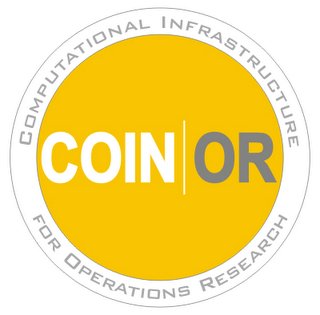In the discussion of CPLEX versus Gurobi software, the discussion took an interesting turn when it came to open source (like that of COIN-OR). Sebastian, bemoaning the cost of commercial packages such as CPLEX said:
I think another long-term way to make OR feasible in situations where the cost of Cplex cannot be justified is to invest in the long term development of open source alternatives. The COIN-OR solvers are quite good already (for LP and general non-linear programs they are even competitive with state-of-the-art). Moreover the CPL license IBM chose is very liberal and allows the solvers to be tightly integrated into commercial products without further obligations.
If more companies would support the development as a long-term investment it could be in their best interest.
Shiva, an OR practitioner for a decade replied:
Sebastian: We did investigate open-source methods (including COIN), but after reading the fine print, legal departments tend to shoot it down with prejudice to avoid exposing the company to potential lawsuits down the road. It was another frustrating experience, since like all O.R folks, I love what COIN’s been doing.
Larry, of IEOR Tools, replied:
Shiva, Great points on barrier to entry. I too have been caught in that world of justifying an IT expense for the sake of desicion modeling. For instance, one kind find a decision analysis by just using a spreadsheet. Is it optimal? No. Does it offer a solution? Yes. The key is to justify the long term gains of optimal decision processes. I believe that is the trick.
Yet I have definitely found a great niche and I think the OR community can great help with this issue. Open Source software has the added benefit of community support, development, and implementation without the cost structures. It’s something I have started talking about on my blog. I believe it can have profound affects on the OR community.
I repeat all this because this is one of the best exchanges we have had on MTORB. I am part of COIN-OR (a member of the “Strategic Leadership Board”, though I feel at sea at this compared with my more experienced colleagues). And it does interest me why more people don’t use COIN-OR. For me, there are issues with documentation: I don’t have a lot of time when I learn a new tool, and much open source stuff doesn’t have documentation and examples at the level of commercial software. I spent a summer working with Symphony, now at COIN-OR, and it was great fun. I even put together a document on my experience that was part of the distribution at one point. But I am not sure how many summers I can spend on working through new software. So I use COIN-OR software but not as much as I should.
I am also interested in why people do use COIN-OR and other open source tools. I very much welcome thoughts on this issue, and thank Sebastian, Shiva, and Larry for getting this going.
 Excellent news about
Excellent news about  It is heartening to see former President Clinton talk about “Operations Research” and even better to see outside groups see the promise of our field. At
It is heartening to see former President Clinton talk about “Operations Research” and even better to see outside groups see the promise of our field. At 